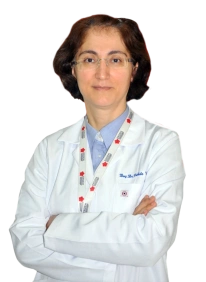Pediatric Neurology
It is a discipline dealing with the diagnosis and treatment of diseases involving the child's brain.
Interests of Pediatric Neurology:
- Neurological follow-up of risky babies (all premature babies, babies who have various problems that may influence the brain at birth and in the neonatal period)
- Developmental retardation (fine and gross motor, language and personal social areas)
- Loose baby (hypotonia)
- Headache (migraine type, tension type, mixed type, etc.) and migraine variants
- Febrile convulsion, breath holding spell, afebrile convulsion, seizure-like conditions
- Epilepsy
- Cerebral palsy
- Mental retardation and accompanying conditions
- Children with congenital or acquired brain abnormalities
- Diseases involving the muscle and muscle-nerve junction
- Neurometabolic diseases (metabolic diseases are frequently encountered in our country due to consanguineous marriages. The most common is phenylketonuria)
- Progressive neuro-degenerative diseases progressing with loss of acquired skills
- Autism-pervasive developmental disorder spectrum
- Neurogenetic diseases
- Speech disorders
- Dizziness
- Movement disorders
- Breath holding spell
- Syncope
- Microcephaly
- Macrocephaly
- Tic disorders
- Premature baby impression
The main target in risky baby follow-up is to detect neurological problems at the earliest possible period, to take precautions and to ensure that the baby catches a normal neurological development. The child's brain continues to develop after birth. Other regions undertake the duties of unfunctioning places. This is called the plasticity of the brain. Every conscious stimulus from the outside, even touching the baby, creates positive signals in the brain.
For this purpose, in the Pediatric Neurology Clinic at our hospital; detailed neurological evaluation is made for the babies at risk, suggestions to support development are given, and physiotherapy can be applied in the Pediatric Physiotherapy Unit to eliminate the identified problems. With early diagnosis and prevention, satisfactory results can be obtained, especially in the neurological problems of premature babies.
Epilepsy is a common condition in society. It can also occur in children for various reasons and can manifest itself in different clinical forms. Electroencephalography (EEG) is used in the diagnosis. In our hospital, EEG is performed during sleep and wakefulness in ideal conditions in Pediatric EEG Laboratory.
Epilepsy treatment is a long-term treatment requiring drug administration to the child every day for at least two years. Therefore, cooperation with the family is the main key to success in treatment. Making diagnosis of some neurological diseases provides a prenatal diagnosis to the family and ensures that similar problems are not encountered in the following child.
As a result, all efforts to protect the child's brain, help to bring healthier individuals to the society in the future.
Video EEG Monitoring
It is a method where electrical activities of the child’s brain are monitored simultaneously through a camera. This method, which is used to distinguish between seizures and similar problems, is the gold standard in diagnosis.
In the resistant epilepsies, seizure recording provides valuable information about which part of the brain the epileptic focus originates from.
Our hospital provides Video EEG Monitorization for at least 3 hours for children and for 12 hours in special conditions.
Appointment at Pediatric Neurology
You can contact us to make an appointment with our Pediatric Neurology department.

